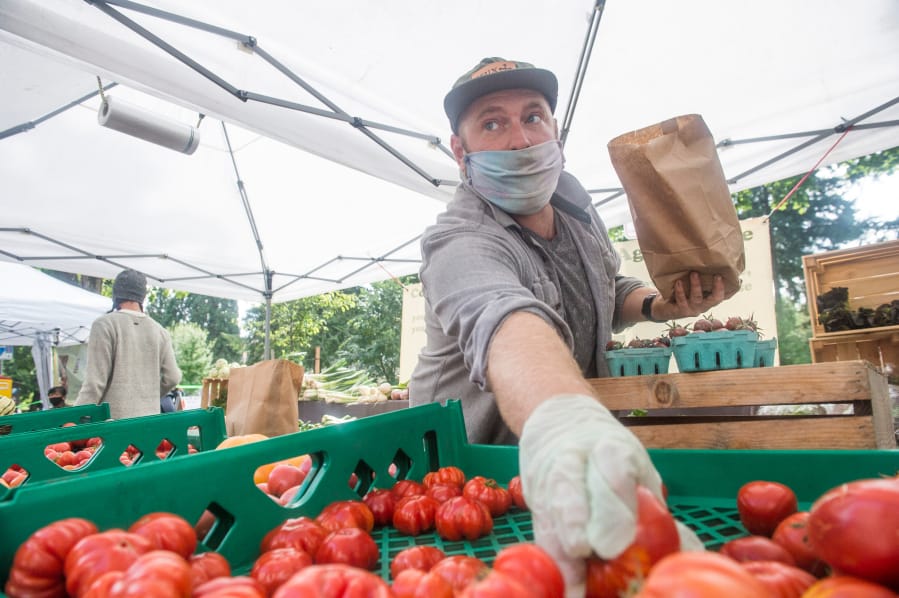It’s Linda Anderson’s 15th year running a vendor stand at the Vancouver Farmers Market, but things are quite different this time around.
For starters, Anderson started coming to the market about a month ago. Market organizers implemented a number of restrictions aimed at combating the spread of the novel coronavirus, which included leaving out artisanal vendors like Anderson, who operates One of a Kind Pottery, until around July.
Anderson said she held off longer due to concerns about the pandemic. She said her sales have decreased, partly due to her not displaying her colorful garden stakes, which people would have, in the past, gathered around and commented on.
“I contend that things are down a bit, but all I can do is take it in stride,” Anderson said. “I’ll be here through the rest of the year.”
The downtown market had a late start this year due to COVID-19. May 2 was its first day. Usually, the market opens on the third weekend of March.
Organizers tried something different during the shutdown of operations. Vancouver Farmers Market Executive Director Jordan Boldt said staff worked to connect customers and vendors directly, and then helped with pick-ups of preordered products.
There were some challenges with customers meeting farmers near Esther Short Park, the normal location of the market. This issue was remedied when the Port of Vancouver allowed the market to use part of the property at Terminal 1 near WareHouse ’23, which provided customers access to food in summer’s early months.
Since the downtown market kicked off in May, it’s been open every Saturday and Sunday, with the exception of one smoky weekend, said Boldt. The market was canceled on the weekend of Sept. 12 due to hazardous air conditions — smoke from wildfires in Oregon, California and the Big Hollow Fire still burning in Gifford Pinchot National Forest blanketed Vancouver.
A construction project to replace components of the Interstate 5 Bridge’s aging lift system that shut down northbound lanes into Vancouver may have had an impact on attendance last weekend, but there were other factors at play, said Boldt.
There was some lingering smoke from the wildfires, and it was rainy. Past surveys have shown that up to 20 percent of the people who visit the market come from north Portland.
Customers attendance year-to-date, as of Friday, totaled 72,000, according to numbers provided by Vancouver Farmers Market. By this time last year, 384,000 people had visited the market.
That’s almost an 80 percent reduction.
Vendor attendance is a little harder to compare to last year, since the market was closed down for a number of weeks and when it was allowed to open, it was under a reduced capacity. In 2019, it averaged 130 vendors per day. When the market opened in May, it was limited to 35 vendors, a 73 percent reduction. It’s since expanded to 65 vendors.
The market’s setup has changed, with the health safety measures in place.
Booths are placed 10 feet apart. Customers enter and exit through designated areas, where they are counted to limit the number of people there at one time. Vendor displays are often behind barriers. Almost all transactions are touchless, at least until the salespeople hand over a customers’ chosen purchases.
Jalene Dick, office manager for Farm Maid Soap, which sells skin care products and candles, said sales have been OK this summer despite people not being able to touch their products.
“We are no-touch at this time. They tell us what they want to see and we hold it out for them. Everyone is doing fine with sticking to the rules, but folks just have the urge to touch things,” Dick said.
Overall, enforcing social distancing guidelines hasn’t been terribly difficult, said Boldt. Having the state issue a mask mandate was helpful, as before the market could not enforce it, he said.
“In general, customers are very conscientious and respectful and our vendors help by reinforcing social distancing guidelines in their respective booths. We’ve certainly had our share of ‘anti-mask’ folks, especially early on, but that tapered off pretty fast,” Boldt said.
Michael Sullivan, with N & M Herb Nursery Outlet, said this year’s been a challenge, but it’s a pleasure to sell downtown. He said before the mandate, they weren’t selling to people who refused to wear masks, which made for some awkward interactions.
Prior to getting a spot there in June, the plants were being sold near WareHouse ’23. It worked but was out of the way, and the downtown spot has allowed him to build a consistent customer base.
“It’s definitely not comparable to last year, especially since April and May are our golden months, but it’s well worth coming,” Sullivan said.
On average, the businesses in the market are reporting lower sales this year, but not necessarily 80 percent lower in relation to the customer attendance, according to Boldt.
“People who come tend to be here to shop, and some vendors are even doing better than last year, which was a record year for many. This is especially true among produce farmers and ranchers selling meat,” said Boldt.
Quackenbush Farm, in its fifth year at the market, has an increased number of sales this year, said intern Aaron Stubbs. The Saturday market is the highest sales day for the company, he said.
The increase may have something to do with Quackenbush’s uptick in community supported agriculture, or CSA shares — prepackaged boxes of vegetables that customers order and come downtown to pick up.
“People are thanking us that we’re here. They’re grateful. This year, we have more of a relationship with them. They pick up the boxes, give us feedback on the things they’d like, talk about what they’re like to see added. It’s definitely more of a relationship rather than a simple transaction,” Stubbs said.
Businesses that are not doing as well as the vegetable stall will have extra time to sell their goods. Boldt said that starting Nov. 7, the market will run every Saturday for an additional seven weeks.
It’s partly an effort to move toward a year-round market envisioned by its board.




